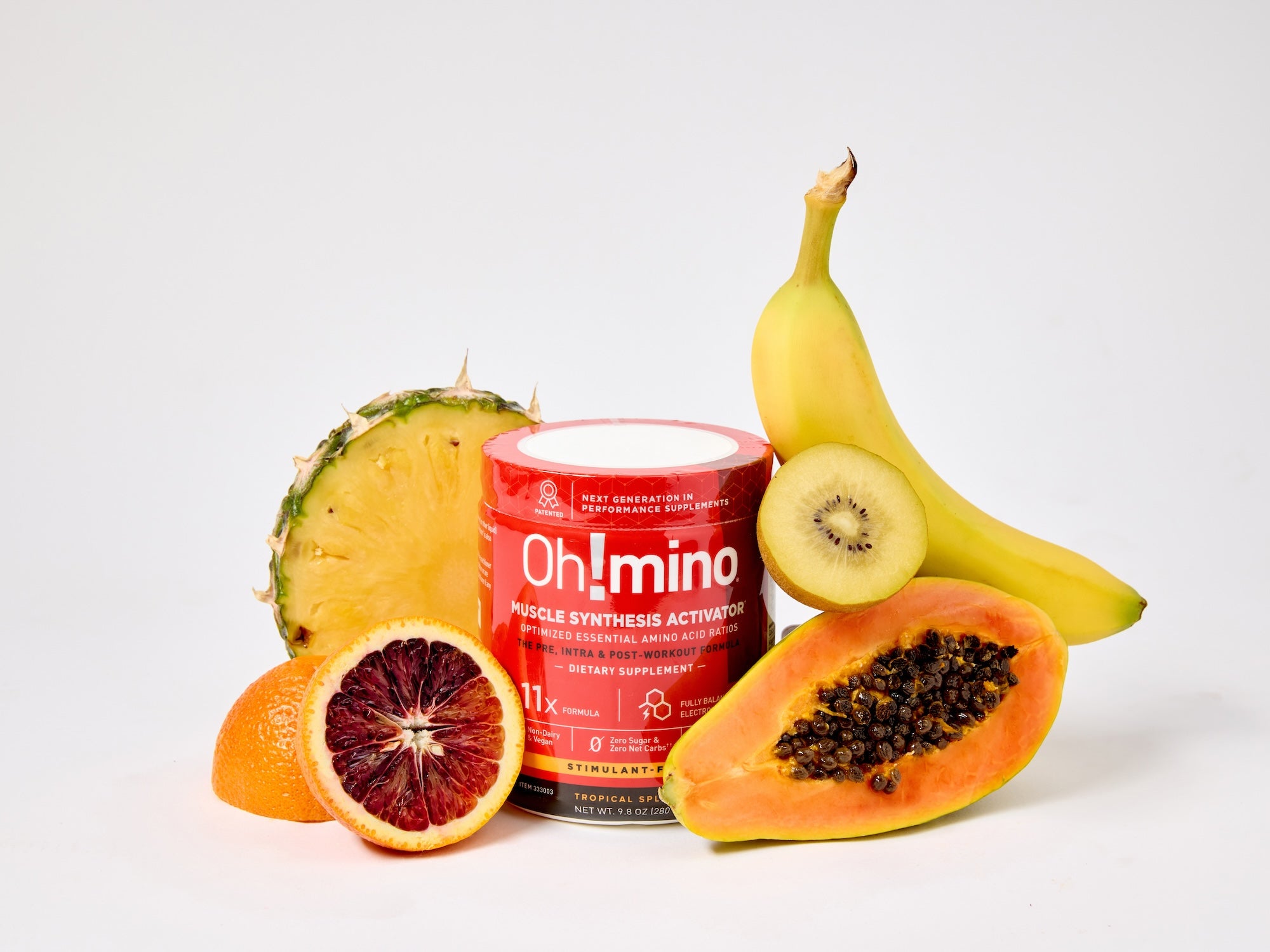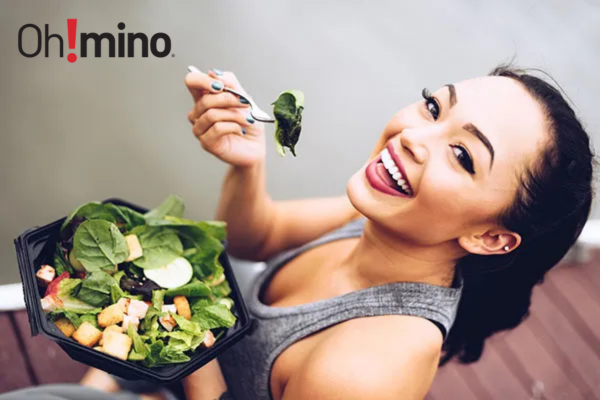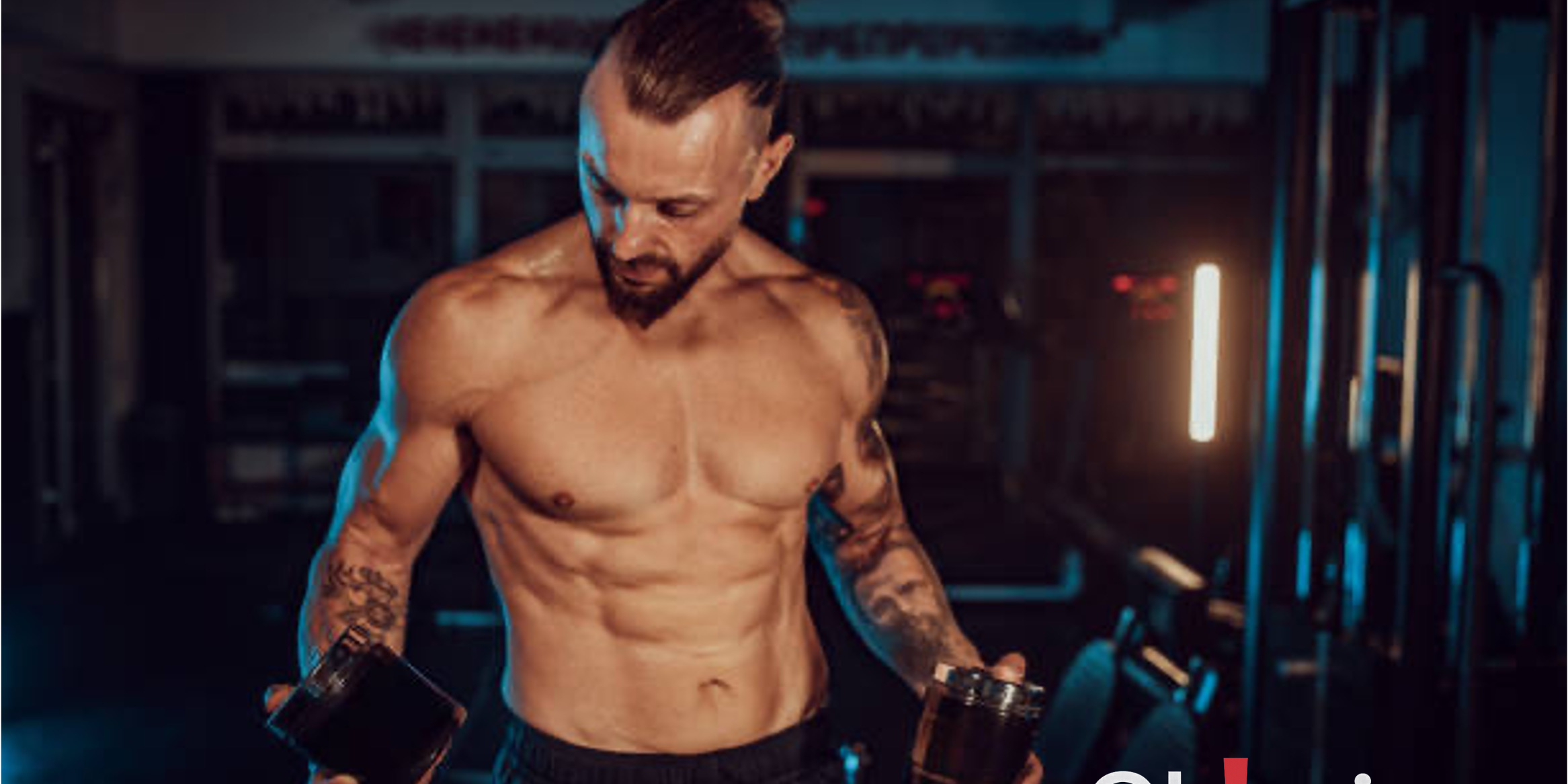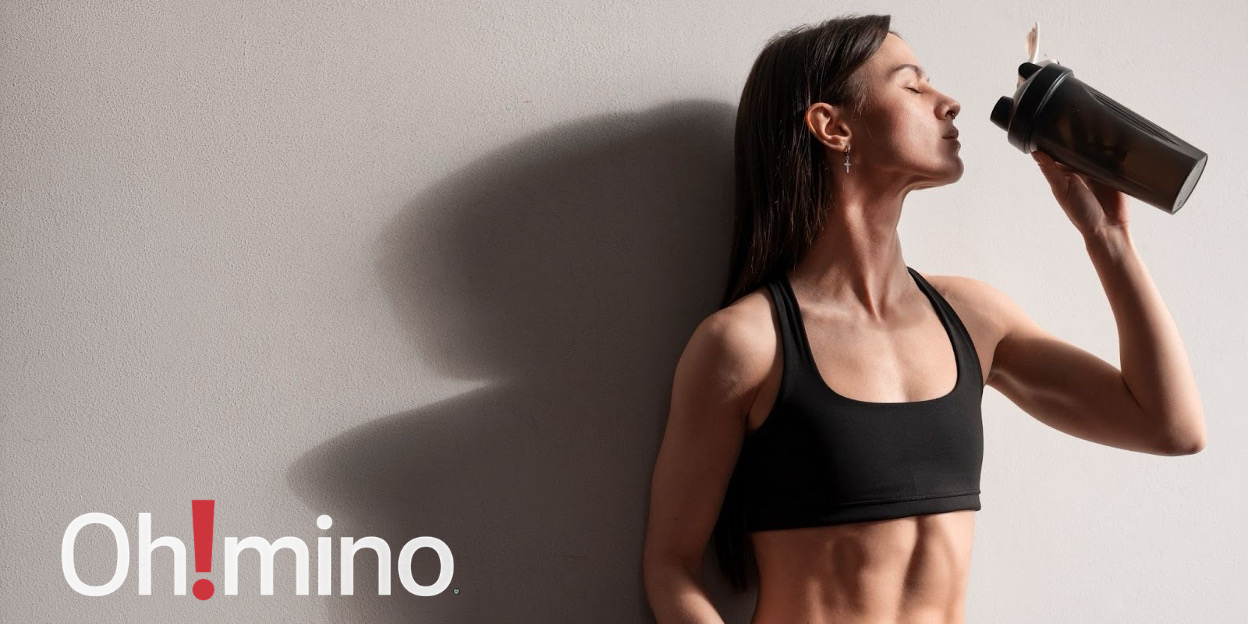Key Takeaways
-
Vegans need all nine essential amino acids but may struggle with lysine, methionine, and tryptophan without proper planning
-
Common symptoms of amino acid deficiency include fatigue, muscle loss, poor recovery, and mood changes
-
Strategic food combining (like beans with rice) can help vegans naturally obtain complete protein profiles
-
Most vegans can thrive with proper amino acid intake through smart nutrition choices
-
Oh!mino® Muscle Synthesis Activator delivers all 9 essential amino acids, including the crucial BCAAs, in one convenient supplement, bridging the potential nutritional gaps in vegan diets.
The Truth About Amino Acids for Vegans
The old myth that vegans can't get complete proteins has been thoroughly debunked. The truth is that plant foods contain all amino acids; they just have different amino acid profiles and proportions.
The key isn't finding magical "complete" protein sources but rather understanding how to combine various plant foods throughout your day to meet all your amino acid requirements.
Your body doesn't maintain amino acid storage like it does fat reserves. This means you need a regular intake of all essential amino acids through diet or supplements. For vegans, this requires more thoughtful eating than for omnivores, who automatically get complete amino profiles from animal products. Strategic consumption is the name of the game!
|
Oh!mino©: Elevate Your Performance. Accelerate Your Recovery. Science-Backed Superiority for Every Fitness Journey Power Your Goals with Proven Results:
The Oh!mino® Advantage: ✓ Patented formula that’s 11x more effective than protein, 20x more effective than BCAAs Choose Your Perfect Formula: Available in refreshing Tropical Slash or Berry Blast flavors, with stimulant-free or caffeinated options. Prefer capsules? We've got you covered with the same powerful formula. Take before, during, or after training—one solution for your entire workout. |
Essential Amino Acids Explained
Amino acids are the building blocks that create proteins in your body, think of them as the Lego pieces that construct everything from muscle tissue to enzymes and hormones.
Your body can produce some amino acids internally (non-essential), but the essential ones must come from your diet. This is where many vegans can run into challenges without proper planning.
Complete vs. Incomplete Proteins
The concept of "complete" versus "incomplete" proteins has evolved in nutritional science. A complete protein contains adequate amounts of all nine essential amino acids your body needs. Animal products naturally provide complete proteins, while most individual plant foods have lower amounts of one or more essential amino acids, traditionally labeled as "incomplete."
However, this doesn't mean plant proteins are inferior! It simply means vegans need to consume a variety of plant foods to create complementary amino acid profiles. The good news is that you don't even need to combine these foods at the same meal; your body is smart enough to use amino acids consumed throughout the day to build complete proteins.
For example, grains tend to be lower in lysine but higher in methionine, while legumes show the opposite pattern. By including both food groups in your daily diet, you naturally create a complete amino acid profile.
Nine Essential Amino Acids
Your body requires nine essential amino acids that you must obtain through diet. These powerhouse compounds each play vital roles in your health and well-being:
-
Leucine: Promotes muscle protein synthesis and recovery
-
Lysine: Supports calcium absorption, collagen formation, and immune function
-
Threonine: Critical component of structural proteins and immune function
-
Valine: Supports energy production and muscle growth
-
Phenylalanine: Helps produce other amino acids and brain chemicals
-
Histidine: Supports growth, tissue repair, and blood cell production
-
Isoleucine: Critical for muscle metabolism and immune function
-
Tryptophan: Precursor to serotonin and melatonin for mood and sleep
-
Methionine: Important for metabolism and detoxification
Common Deficiencies in Vegan Diets
While a well-planned vegan diet can provide all essential amino acids, three particular amino acids deserve special attention. These "limiting amino acids" are often found in lower quantities in plant foods, making them potential nutritional weak spots for vegans who don't strategically plan their meals.
Lysine Shortage
Lysine often takes the spotlight as the most challenging amino acid for vegans to obtain in sufficient quantities. This essential amino acid plays crucial roles in calcium absorption, collagen formation, and immune function.
When your body lacks adequate lysine, you might notice slower recovery from workouts, a compromised immune response, or even skin and connective tissue issues.
While most plant proteins contain some lysine, grains (a vegan staple) typically have lower concentrations. This is why relying heavily on grains without adequate legume consumption can potentially lead to lysine insufficiency. The good news is that legumes like lentils, chickpeas, and beans are lysine powerhouses! Just one cup of cooked lentils provides about 1,200 mg of lysine, a significant portion of your daily requirement.
Methionine Concerns
Methionine supports metabolism and detoxification and helps your body create critical compounds like glutathione (your body's master antioxidant). Methionine insufficiency can contribute to hair loss, skin problems, and weakened nail growth.
Interestingly, while legumes may be lower in methionine, grains, nuts, and seeds typically contain good amounts. This perfect complementary relationship between food groups is why varied eating is the ultimate key to vegan nutrition success.
Tryptophan Levels
Tryptophan deserves special attention since it's the precursor to serotonin (your "feel-good" neurotransmitter) and melatonin (your sleep hormone). Low tryptophan can potentially affect mood, sleep quality, and even appetite regulation.
For vegans, getting enough tryptophan means that you need to make some deliberate food choices, as it's less abundant in many plant foods compared to animal proteins.
Warning Signs Your Body Needs More Amino Acids
Physical Symptoms
Unexplained muscle loss or difficulty maintaining muscle mass despite consistent training could indicate inadequate protein synthesis due to amino acid shortages. Similarly, slow recovery from workouts, persistent soreness, or frequent injuries might suggest your muscles aren't getting the building blocks they need to repair and grow.
Skin, hair, and nail problems can also signal amino acid deficiencies. Since protein is essential for maintaining these tissues, you might notice brittle nails, thinning hair, or poor skin elasticity when certain amino acids are lacking.
Additionally, compromised immune function with frequent illnesses could indicate your body's defense systems aren't getting the amino acid support they require.
Mental Health Effects
The connection between amino acids and mental well-being is profound yet often overlooked.
Amino acids serve as precursors to neurotransmitters that regulate mood, motivation, and cognitive function. Tryptophan specifically is critical for serotonin production, which influences feelings of happiness and well-being.
When amino acid intake is insufficient, you might experience mood disturbances, increased anxiety, or persistent brain fog. These symptoms reflect real biochemical imbalances that proper nutrition can help address.
Energy and Recovery Issues
Feeling perpetually fatigued despite adequate rest? Amino acid deficiencies might be the culprit. Essential amino acids play vital roles in energy production pathways and oxygen transport throughout your body. Without sufficient amounts, your cells may struggle to generate the energy needed for optimal performance and daily functioning.
Additionally, prolonged recovery times after physical activity can indicate your body lacks the amino acid resources needed for tissue repair. Athletes and active individuals have heightened amino acid requirements, making this population particularly vulnerable to deficiency symptoms when following a vegan diet without strategic planning.
Supplement Options Worth Considering
While whole foods should form the foundation of your vegan nutrition plan, strategic supplementation can help fill potential gaps in your amino acid intake.
Plant-Based Protein Powders
Quality plant protein powders offer convenience and concentrated amino acids when whole food options aren't practical. The best formulations combine multiple plant protein sources to create more complete amino acid profiles.
For example, a blend of pea protein (high in lysine) with rice protein (high in methionine) creates a more balanced amino acid profile than either source alone.
Look for products with minimal additives, no artificial sweeteners, and third-party testing for quality assurance. Many brands now offer digestive enzymes in their formulations to enhance protein absorption and reduce potential digestive discomfort.
Individual Amino Acid Supplements
In some cases, supplementing with specific individual amino acids might be appropriate. For instance, if you consistently struggle to include lysine-rich foods in your diet, a targeted lysine supplement could help bridge that gap. Similarly, athletes with specific recovery needs might benefit from additional leucine, which plays a crucial role in muscle protein synthesis.
However, proceed with caution here. Individual amino acid supplementation should be approached thoughtfully, ideally with guidance from a nutrition professional. Taking isolated amino acids in large amounts can potentially create imbalances in the absorption or utilization of other amino acids. Start with whole foods, then consider complete protein supplements before moving to individual amino acids.
EAAs Supplements
Essential amino acids, namely Histidine, Isoleucine, Leucine, Lysine, Methionine, Phenylalanine, Threonine, Tryptophan, and Valine, have gained popularity in the fitness world for their role in muscle protein synthesis and recovery.
For vegan athletes engaged in intense training, EAA supplements help support muscle maintenance and recovery, particularly when calorie intake is restricted or during fasted training sessions.
When choosing vegan EAAs, verify that the products are truly plant-derived, as many EAA supplements are manufactured using animal hair or feathers. Look for supplements that specify fermented plant sources or synthetic processes that don't involve animal products.
As with all supplements, quality matters tremendously; choose reputable brands with transparent sourcing and manufacturing practices.
Oh!mino®'s Solution for Vegan Amino Acid Excellence
At Oh!mino, we’ve created our Muscle Synthesis Activator specifically to bridge nutritional gaps while supporting your plant-powered performance goals.
Our Oh!mino® Muscle Synthesis Activator delivers all 9 essential amino acids, including the crucial BCAAs (branched-chain amino acids) that are particularly important for muscle protein synthesis and recovery.
The formula containing a patented balanced blend of L-Leucine, L-Lysine, L-Threonine, L-Valine, L-Phenylalanine, L-Histidine, L-Isoleucine, L-Tryptophan, and L-Methionine (as well as the only semi-essential amino acid, Glycine) goes beyond basic amino acids by including balanced electrolytes that optimize hydration and nutrient delivery to your cells.
Mix 1–2 scoops with 8–12 oz of water or juice and consume before, during, and after your workouts for comprehensive support. This targeted timing ensures your muscles receive the building blocks they need when they need them most, supporting enhanced recovery and reduced muscle soreness.
Your commitment to ethical eating doesn't have to come at the expense of peak performance or recovery; with the right approach, you can have both.
Try Oh!mino® Muscle Synthesis Activator today!
Frequently Asked Questions:
Can I get all essential amino acids from plants alone?
Absolutely! Every essential amino acid exists in plant foods, though in different proportions than animal products. By consuming a variety of plant proteins throughout your day, like legumes, grains, nuts, seeds, and vegetables, you can easily meet all your amino acid requirements without supplements.
How much protein do vegans actually need daily?
The standard protein recommendation for healthy adults is 0.8 grams per kilogram of body weight daily (about 0.36 grams per pound). However, research suggests that vegans may benefit from slightly higher intake, around 1.0 gram per kilogram, due to the potentially lower digestibility of some plant proteins. This means a 150-pound vegan might aim for about 68–75 grams of protein daily for basic health maintenance.
What's the best vegan protein supplement for athletes?
The ideal vegan protein supplement combines multiple plant sources to create a more complete amino acid profile while offering good digestibility, minimal additives, and third-party testing for quality assurance. For serious athletes, supplements with all EAAs can support muscle protein synthesis and recovery, especially when training volume is high.
Can amino acid deficiency cause hair loss?
Yes, insufficient protein and amino acid intake can contribute to hair thinning and loss. Hair is primarily made of the protein keratin, which requires adequate amino acids for production. When your body faces protein insufficiency, it prioritizes essential functions over hair growth, potentially leading to increased shedding and reduced new hair formation.
How can Oh!mino® Muscle Synthesis Activator support vegans with amino acid concerns?
Our Oh!mino® Muscle Synthesis Activator provides comprehensive amino acid support with all 9 essential amino acids, including crucial BCAAs (leucine, isoleucine, and valine) that are crucial for muscle growth and recovery. The formula also includes balanced electrolytes for optimal hydration and nutrient delivery.
Simply mix 1–2 scoops with 8–12 oz of water or juice and take before, during, and after workouts. This all-in-one supplement helps you gain strength, build muscles, and recover faster.





